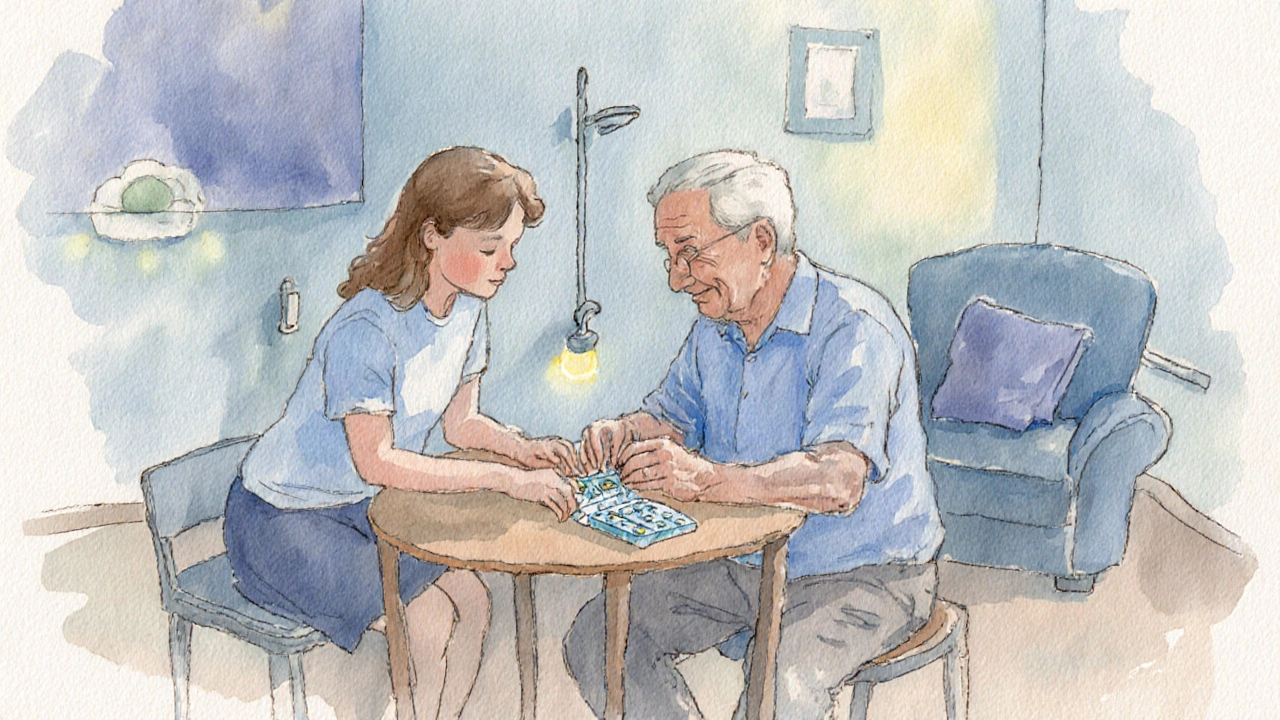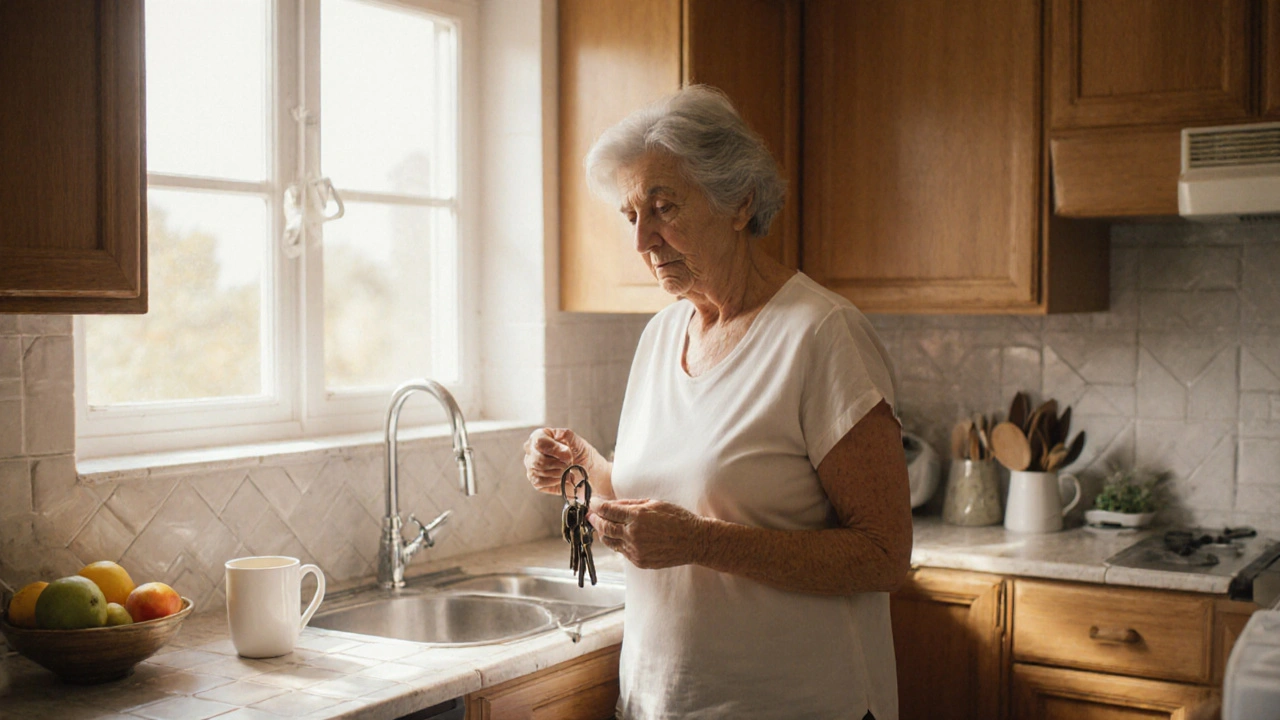Alzheimer's Disease Stages Explorer
This interactive tool helps you understand the six recognized stages of Alzheimer's disease. Click on any stage below to learn more details.
No Impairment
Normal cognition
Very Mild
Subtle forgetfulness
Mild
Memory issues, task difficulty
Moderate
Noticeable memory loss
Moderately Severe
Need help with daily tasks
Severe
Full dependence
Stage 1 – No Impairment
In this stage, there are no detectable symptoms. Cognitive functions remain normal.
Care Focus:
Routine health checks and preventive care.
Stage 2 – Very Mild
Subtle memory lapses begin to appear. People may forget names or misplace items.
Average Duration:
2–4 years
Care Focus:
Education about Alzheimer's, lifestyle risk reduction.
Stage 3 – Mild
Difficulty with complex tasks, occasional disorientation, and memory issues become more apparent.
Average Duration:
2–3 years
Care Focus:
Medication review, safety planning, and support for daily activities.
Stage 4 – Moderate
Noticeable memory loss, trouble with personal finance, and wandering behavior occur.
Average Duration:
2–3 years
Care Focus:
Home modifications, caregiver support, and increased supervision.
Stage 5 – Moderately Severe
Need help with dressing, personality changes, and incontinence become common.
Average Duration:
1–2 years
Care Focus:
24-hour supervision, coordination with healthcare services, and specialized care.
Stage 6 – Severe
Loss of ability to communicate, full dependence on others for daily activities.
Average Duration:
1–3 years
Care Focus:
Palliative care, advanced directives, and end-of-life support.
Progression Timeline Overview
The average progression from stage 1 to 6 takes 8–12 years, though this varies significantly by individual factors.
When a loved one receives a diagnosis of Alzheimer’s disease is a progressive neurodegenerative disorder and the most common cause of dementia, questions about what comes next flood in. Families want to know what each stage looks like, how fast the changes happen, and what practical steps they can take now to stay ahead of the curve. This guide walks through the clinically recognised stages, highlights the key signs you’ll see, and gives concrete ideas for planning care, medication, and support.
Key Takeaways
- Alzheimer’s disease typically moves through six stages, from no symptoms to severe decline.
- Early stages (1‑2) involve subtle memory lapses; middle stages (3‑4) bring noticeable functional loss; late stages (5‑6) require full‑time assistance.
- Regular assessments with tools like the Mini‑Mental State Examination (MMSE) help track progression.
- Cholinesterase inhibitors and memantine can modestly slow decline in stages 2‑4, but they don’t stop the disease.
- Advance care planning, legal arrangements, and a solid support network are crucial before the severe stage sets in.
Understanding Alzheimer’s Disease
Alzheimer’s belongs to the broader family of dementia, a term that describes a loss of cognitive abilities severe enough to interfere with daily life. The disease is characterised by the buildup of amyloid plaques and neurofibrillary tangles in the brain, which disrupt communication between neurons.
National Institute on Aging and the Alzheimer’s Association (NIA‑AA) provide the most widely accepted diagnostic framework. Diagnosis typically involves clinical interview, cognitive testing (often the MMSE), neuroimaging (MRI or PET scans), and ruling out other causes.
The Six Recognised Stages
Clinicians often use the Global Deterioration Scale (GDS) or the Clinical Dementia Rating (CDR) to split Alzheimer’s into six stages. Each stage has a typical symptom pattern, an average duration, and distinct care needs.
| Stage | Typical Symptoms | Average Duration | Primary Care Focus |
|---|---|---|---|
| 1 - No Impairment | None; normal cognition | - | Routine health checks |
| 2 - Very Mild | Forgetfulness of names, misplacing items | 2‑4years | Education, lifestyle risk‑reduction |
| 3 - Mild | Difficulty with complex tasks, occasional disorientation | 2‑3years | Medication review, safety planning |
| 4 - Moderate | Noticeable memory loss, trouble with personal finance, wandering | 2‑3years | Home modifications, caregiver support |
| 5 - Moderately Severe | Need help with dressing, personality changes, incontinence | 1‑2years | 24‑hour supervision, health‑service coordination |
| 6 - Severe | Lost ability to communicate, full dependence | 1‑3years | Palliative care, advanced directives |

Early Stages (1‑2): Subtle Shifts
In the very early phase, most people still function independently. The most common sign is short‑term memory loss - forgetting a recent conversation or misplacing keys. Mood swings, mild anxiety about the diagnosis, and a drop in confidence are also typical.
What you can do:
- Schedule a baseline neuropsychological assessment so future changes are measurable.
- Adopt a brain‑healthy lifestyle: Mediterranean diet, regular aerobic exercise, and social engagement.
- Start a simple daily journal or digital reminder app to reduce frustration.
Middle Stages (3‑4): Noticeable Impact
By the mild to moderate phases, friends and family will notice the change. Tasks like paying bills, following a recipe, or navigating familiar streets become challenging. Language errors (e.g., calling a ‘spoon’ a ‘fork’) appear more often.
Alzheimer's stages often bring caregiving into daily routine. The person might still enjoy hobbies but will need prompts or assistance.
Key actions at this point:
- Discuss medication options. Cholinesterase inhibitors (donepezil, rivastigmine) can modestly improve cognition for 6‑12months.
- Consider a memantine if moderate symptoms persist; it works on a different brain pathway.
- Engage a professional caregiver or join a local support group such as the Manchester Memory Clinics’ caregiver network.
- Make home safety upgrades: remove loose rugs, install night‑lights, and use medication dispensers.
Late Stages (5‑6): Full Dependence
When the disease reaches the moderately severe and severe stages, daily living becomes impossible without assistance. Incontinence, severe agitation, and loss of ability to recognize close relatives are common. Swallowing difficulties raise the risk of pneumonia.
Medical focus shifts to comfort:
- Review any remaining disease‑modifying drugs; side‑effects may outweigh benefits.
- Implement a palliative care plan that includes pain management and respiratory support.
- Finalize legal documents: lasting power of attorney, advance decision, and will - if not already done.
- Explore respite care options to prevent caregiver burnout - many NHS trusts offer short‑term stays.

Planning Your Care Across the Journey
Early preparation saves stress later. Here’s a practical checklist that you can tailor to your situation:
- Medical Records: Keep a central folder (paper or digital) with diagnoses, medication lists, and specialist contacts.
- Legal & Financial: Set up lasting power of attorney with the Office of the Public Guardian, update insurance, and explore benefits like Attendance Allowance.
- Home Safety: Conduct a walkthrough with an occupational therapist; install grab bars and consider a monitored alarm system.
- Support Network: Identify a primary caregiver, backup helpers, and local charities (Alzheimer’s Society, Age UK).
- Technology Aids: GPS trackers for wandering, medication reminders, and simple tablets with large icons for communication.
Regularly revisit the plan-what works at stage 2 may be irrelevant at stage 5.
Common Questions About Alzheimer’s Progression
Below are the questions most families raise during clinic visits.
- How fast will my loved one decline? Progression varies widely; on average, symptoms worsen over 8‑12years, but genetics, overall health, and lifestyle can speed up or slow down the course.
- Can medication stop the disease? No drug can cure Alzheimer’s, but cholinesterase inhibitors and memantine can temporarily ease symptoms.
- When is it safe to move into a residential care home? The decision hinges on safety, the ability to manage personal care, and caregiver capacity. Many move in during stage 4‑5 when wandering and incontinence become daily concerns.
- What should I do about aggression or agitation? Identify triggers (pain, infection, overstimulation), maintain a calm environment, and discuss low‑dose antipsychotics with a doctor only after non‑pharmacologic methods fail.
- Is dementia reversible? Certain causes of dementia (e.g., vitamin B12 deficiency, thyroid problems) are treatable, but Alzheimer’s itself is not reversible.
Frequently Asked Questions
What are the first signs of Alzheimer’s?
Early signs usually involve short‑term memory loss, misplacing everyday objects, and difficulty recalling recent conversations. Mood changes and subtle language slips may also appear.
How is the stage of Alzheimer’s determined?
Clinicians use standardized scales such as the Global Deterioration Scale (GDS) or the Clinical Dementia Rating (CDR), combined with cognitive tests (MMSE, ADAS‑Cog), functional assessments, and neuroimaging.
When should I consider a cholinesterase inhibitor?
These drugs are typically started in the mild‑to‑moderate stages (GDS 2‑4) after confirming the diagnosis. They may improve cognition or daily functioning for several months.
What legal documents are essential?
A lasting power of attorney for health and finance, an advance decision (formerly known as living will), and an up‑to‑date will are crucial before the severe stage.
How can I support my own mental health as a caregiver?
Seek respite services, join caregiver support groups, maintain regular physical activity, and consider professional counseling. Remember, caring for yourself enables you to care better for your loved one.
Alzheimer’s is a journey that reshapes families, but with clear expectations, proactive planning, and the right support, you can navigate each stage with dignity and compassion.


11 Responses
Understanding the six stages helps families anticipate changes and plan ahead. In the very early stages, subtle memory lapses are common and lifestyle tweaks can make a difference. As the disease progresses, regular check‑ins with a neurologist become essential to adjust medication. Home safety modifications, like removing loose rugs, can prevent injuries during the moderate phase. Keeping a centralized medical folder eases coordination among caregivers.
One could argue that the narrative around Alzheimer’s is shaped by forces that benefit from prolonged care costs. The subtle creep of memory loss mirrors how societies forget inconvenient truths, a pattern that repeats across history. While clinicians rely on the Global Deterioration Scale, some wonder whether the scales themselves are calibrated to keep the industry thriving. It feels like we are handed a script, told to watch the stages unfold, while the underlying mechanisms remain cloaked in mystery. Yet, adopting brain‑healthy habits remains a pragmatic step regardless of the hidden agenda.
Look, tossing conspiracy talk into a medical guide just muddies the water, and it's not helpful for anyone trying to cope. The stages are clinically defined; the data behind them are peer‑reviewed, not some secret cabal agenda. If you want actionable advice, focus on the caregiver checklists instead of speculating about profit motives. Honestly, it's best to keep the conversation grounded in evidence.
Yeah, because a checklist solves everything.
The progression of Alzheimer's disease follows a pattern that has been observed across diverse populations.
Stage one, often called no impairment, is essentially a baseline from which future decline is measured.
When patients enter stage two, subtle memory lapses begin to appear, prompting the first conversations about risk reduction.
Clinical tools such as the Mini‑Mental State Examination provide quantitative data that help differentiate between very mild and mild stages.
As the disease moves into stage three, individuals may struggle with complex tasks, and safety planning becomes a priority.
At this point, caregivers often introduce medication reviews to assess the suitability of cholinesterase inhibitors.
Stage four is marked by noticeable memory loss and financial mismanagement, which can lead to legal and fiduciary concerns.
Home modifications, including grab bars and improved lighting, are recommended to reduce fall risk during this phase.
When patients reach stage five, assistance with dressing and personal hygiene is commonly required, and incontinence may arise.
The need for 24‑hour supervision often leads families to consider professional caregiving services or short‑term respite facilities.
Stage six represents severe decline, where communication is lost and full dependence on caregivers is the norm.
Palliative care considerations, including pain management and advance directives, become central in this final stage.
Throughout all stages, regular reassessment allows the care plan to be adjusted in response to changing needs.
It is also important to monitor for comorbid conditions, such as urinary infections, which can exacerbate agitation.
Family members should maintain their own health, as caregiver burnout can negatively affect the quality of care provided.
Overall, a structured approach that integrates medical, legal, and environmental strategies can improve outcomes for both patients and caregivers.
Your comprehensive overview reflects a commendable synthesis of clinical guidelines and practical considerations, and it aligns with established best practices in geriatric care. I would further emphasize the importance of culturally sensitive communication when discussing advance directives with diverse families.
While the guide lists stages, many clinicians argue that the boundaries are more fluid than the chart suggests. In practice, patient trajectories often deviate from the textbook timeline.
Indeed, the fluidity you mention adds a layer of intrigue, yet it also underscores the urgency to act, to intervene, to support! We must rally around those navigating the middle stages, armed with empathy, resources, and unwavering optimism!
Every step forward, no matter how small, builds resilience 🌟 caring for a loved one with Alzheimer’s is a marathon, not a sprint 🚀 remember to celebrate tiny victories and stay connected with supportive communities 🤝
Your encouragement really lifts the spirit and reminds us to keep pushing through the tough days.
Navigating the later stages of Alzheimer's can feel overwhelming, yet a structured plan offers a beacon of stability.
Establishing a reliable medication schedule reduces anxiety for both the patient and the caregiver.
Engaging professional home health aides provides necessary respite and ensures safety during moments of confusion.
Regular physical activity, even simple walks, can sustain mobility and improve mood.
Implementing simple communication tools, such as picture boards, helps maintain a sense of connection.
Monitoring for signs of infection or pain is crucial, as these can exacerbate agitation.
Financial planning, including exploring benefits like Attendance Allowance, alleviates future burdens.
Emotional support groups offer shared experiences that validate the caregiver’s journey.
Remember to prioritize your own health, as a rested caregiver is better equipped to provide compassionate care.
With these measures in place, families can face the progression with dignity and hope.